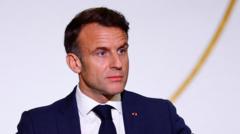French President Emmanuel Macron's recent comments suggesting that African nations have failed to express gratitude for France's military contributions against jihadist insurgencies have ignited significant backlash from leaders in Senegal and Chad. During an ambassadors' conference in Paris, Macron claimed that "no Sahelian nation would be a sovereign nation" without France's intervention, which he argued prevented militant groups from seizing control.
Chad's Foreign Minister, Abderaman Koulamallah, responded emphatically, accusing Macron of showing "contempt" for Africa. He expressed concern that such remarks reflect a dismissive attitude toward the sacrifices made by African nations. Koulamallah urged that French leaders must learn to respect the dignity of the African people, asserting that their contributions to security must be recognized.
Senegal’s Prime Minister Ousmane Sonko also criticized the French president, asserting that France has historically played a role in destabilizing certain African countries, notably highlighting Libya's turmoil and its subsequent impact on regional security. Sonko further stated that Senegal's decision to request the withdrawal of French troops stemmed from its own sovereignty, not from bilateral negotiations with France.
Macron's comments come in light of recent diplomatic shifts, with Chad, Senegal, and other countries reassessing their relationships with France. This includes the end of security agreements with France, amid a wider trend of countries in the Sahel region distancing themselves from French influence. Post-coup governments in Mali, Burkina Faso, and Niger have increasingly turned towards Russia, viewing it as a strategic partner.
Critics have noted that Macron's remarks overlooked the historical sacrifices made by African soldiers during the World Wars, drawing parallels between past injustices and current sentiments of underappreciation. Sonko highlighted that many African soldiers had contributed significantly to France's defense, thus questioning the French narrative regarding its role in African security.
In conclusion, Macron's statements have exacerbated ongoing tensions over France’s neocolonial legacy, and they underscore the intricate dynamics involved in securing African nations' sovereignty amidst a changing geopolitical landscape. As African nations seek to redefine their strategic partnerships, the tension between regional aspirations and historical legacies remains a contentious issue.
Chad's Foreign Minister, Abderaman Koulamallah, responded emphatically, accusing Macron of showing "contempt" for Africa. He expressed concern that such remarks reflect a dismissive attitude toward the sacrifices made by African nations. Koulamallah urged that French leaders must learn to respect the dignity of the African people, asserting that their contributions to security must be recognized.
Senegal’s Prime Minister Ousmane Sonko also criticized the French president, asserting that France has historically played a role in destabilizing certain African countries, notably highlighting Libya's turmoil and its subsequent impact on regional security. Sonko further stated that Senegal's decision to request the withdrawal of French troops stemmed from its own sovereignty, not from bilateral negotiations with France.
Macron's comments come in light of recent diplomatic shifts, with Chad, Senegal, and other countries reassessing their relationships with France. This includes the end of security agreements with France, amid a wider trend of countries in the Sahel region distancing themselves from French influence. Post-coup governments in Mali, Burkina Faso, and Niger have increasingly turned towards Russia, viewing it as a strategic partner.
Critics have noted that Macron's remarks overlooked the historical sacrifices made by African soldiers during the World Wars, drawing parallels between past injustices and current sentiments of underappreciation. Sonko highlighted that many African soldiers had contributed significantly to France's defense, thus questioning the French narrative regarding its role in African security.
In conclusion, Macron's statements have exacerbated ongoing tensions over France’s neocolonial legacy, and they underscore the intricate dynamics involved in securing African nations' sovereignty amidst a changing geopolitical landscape. As African nations seek to redefine their strategic partnerships, the tension between regional aspirations and historical legacies remains a contentious issue.






















